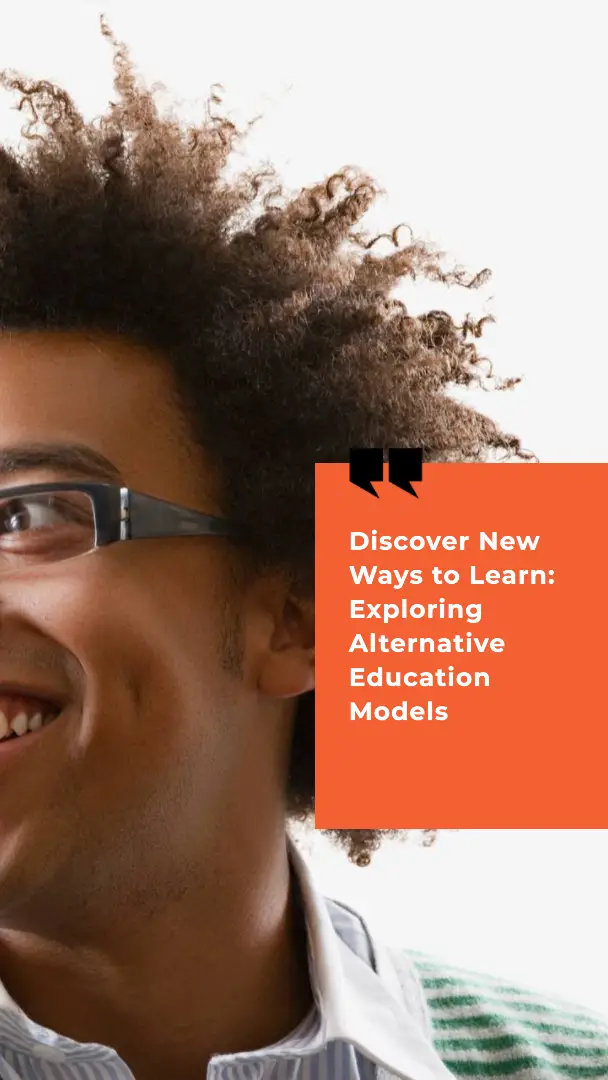
BISSELL Little Green Multi-Purpose Portable Carpet and Upholstery Cleaner, Car and Auto Detailer, with Exclusive Specialty Tools, Green, 1400B
20% OffIntroduction
Alternative education models challenge the conventional methods of teaching and learning. They prioritize individualized instruction, experiential learning, and holistic development. These models acknowledge that every learner is unique, and the one-size-fits-all approach might not cater to their diverse needs and interests.
Alternative education models often emphasize critical thinking, creativity, and practical skills, preparing students for real-world challenges beyond textbooks and exams. Let’s explore some popular alternative education approaches:
Montessori Education
Key Principles: Montessori education, developed by Dr. Maria Montessori, is centered on the belief that children are naturally curious and capable of self-directed learning. In Montessori classrooms, students have the freedom to choose their activities from a range of carefully designed materials. Teachers act as guides, observing and facilitating students’ learning journeys.
Benefits: Montessori education promotes independence, self-discipline, and a love for learning. It fosters a strong sense of community and encourages children to explore their interests at their own pace. Waldorf Education
Waldorf Education
Key Principles: Waldorf education, inspired by Rudolf Steiner, focuses on nurturing a child’s artistic, intellectual, and practical capacities. The curriculum integrates arts, movement, and academics, emphasizing hands-on learning and creative expression. Teachers often stay with the same group of students for several years to build deep connections.
Benefits: Waldorf education aims to develop well-rounded individuals with a strong sense of imagination and creativity. It encourages holistic development and values the role of play in learning.
Unschooling
Key Principles: Unschooling challenges traditional schooling altogether. It empowers students to direct their own learning based on their interests and passions. There are no formal curricula or structured lessons. Instead, learning happens naturally through exploration, real-world experiences, and self-directed projects.
Benefits: Unschooling respects a student’s autonomy and encourages them to be active learners. It can lead to deep engagement with subjects and the development of critical thinking and problem-solving skills.
Project-Based Learning
Key Principles: Project-Based Learning (PBL) shifts the focus from rote memorization to hands-on projects. Students work on complex, real-world problems, which require them to apply knowledge from various subjects. PBL fosters collaboration, research skills, and a deeper understanding of concepts.
Benefits: PBL prepares students for practical challenges by developing their research, teamwork, and presentation abilities. It also enhances their ability to connect ideas across disciplines.
FAQs
Q1: Are alternative education models recognized by traditional educational institutions? A: While alternative education models might not always align with traditional standards, they are gaining recognition as effective approaches to learning. Some universities and employers value the unique skills and perspectives developed through these models.
Q2: How do alternative education models address core subjects like math and science? A: Alternative models often incorporate core subjects into their curricula, but in ways that are more experiential and context-based. For example, math might be learned through real-world applications or projects.
Q3: Do alternative education models hinder a student’s social development? A: No, in fact, many alternative models emphasize social interaction and collaboration. Students often learn to work in multi-age groups, enhancing their interpersonal skills.
Q4: Can parents implement alternative education approaches at home? A: Yes, many parents choose to homeschool using alternative methods. However, a deep understanding of the chosen approach and a commitment to providing a rich learning environment are essential.
Q5: How do children learn essential skills? Unschooling believes that skills are naturally acquired when a child is motivated to learn, and real-life experiences provide ample learning opportunities.
Q6: Can unschooled children transition to higher education? Many unschooled students successfully transition to college and other educational paths due to their self-directed learning skills.
Q7:How are subjects integrated in PBL? PBL integrates various subjects into a single project, showing students the interconnectedness of knowledge.
Q8: Are teachers still involved? Teachers guide the project process, providing structure and support while encouraging student autonomy.
Q9: Is homeschooling legal? Homeschooling regulations vary by location, so it’s essential to research and comply with local laws.
Q10: What about socialization? Homeschooled children often participate in co-op classes, clubs, sports, and community events to interact with peers.
Conclusion
Alternative education models offer exciting avenues for personal and intellectual growth. By focusing on individual needs, fostering creativity, and promoting practical skills, these models prepare students for a rapidly changing world. While they may not suit every learner or context, they serve as a testament to the evolving landscape of education. As we continue to explore new ways of teaching and learning, alternative education models will likely play an increasingly significant role in shaping the future of education.











